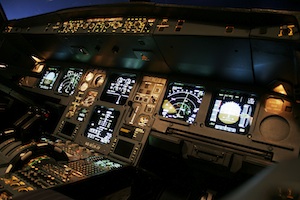A magazine where the digital world meets the real world.
On the web
- Home
- Browse by date
- Browse by topic
- Enter the maze
- Follow our blog
- Follow us on Twitter
- Resources for teachers
- Subscribe
In print
What is cs4fn?
- About us
- Contact us
- Partners
- Privacy and cookies
- Copyright and contributions
- Links to other fun sites
- Complete our questionnaire, give us feedback
Search:
Let the brain take the strain

Whenever humans have complicated, repetitive jobs to do, designers set to work making computer systems that do those jobs automatically. Autopilot systems in airplanes are a good example. Flying a commercial airliner is incredibly complex, so a computer system helps the pilots by doing a lot of the boring, repetitive stuff automatically. But in any automated system, there has to be a balance between human and computer so that the human still has ultimate control. It's a strange characteristic of human-computer interaction: the better an automated program, the more its users rely on it, and the more dangerous it can be.
The problem is that the unpredictable always happens. Automated systems run into situations the designers haven't anticipated, and humans are still much better at dealing with the unexpected. If humans can't take back control from the system, accidents can happen. For example, some airplanes used to have autopilots that took control of a landing until the wheels touched the ground. But then, one rainy night, a runway in Warsaw was so wet that the plane began skidding along the runway when it touched down. The skid was so severe that the sensors never registered the touchdown of the plane, and so the pilots couldn't control the brakes. The airplane only stopped when it had overshot the runway. The designers had relied so much on the automation that the humans couldn't fix the problem.
Many designers now think it's better to give some control back to the operators of any automated system. Instead of doing everything, the computer helps the user by giving them feedback. For example, if a smart car detects that it's too close to the car ahead of it, the accelerator becomes more difficult to press. The human brain is still much better than any computer system at coming up with solutions to unexpected situations. Computers are much better off letting our brains do the tricky thinking.


